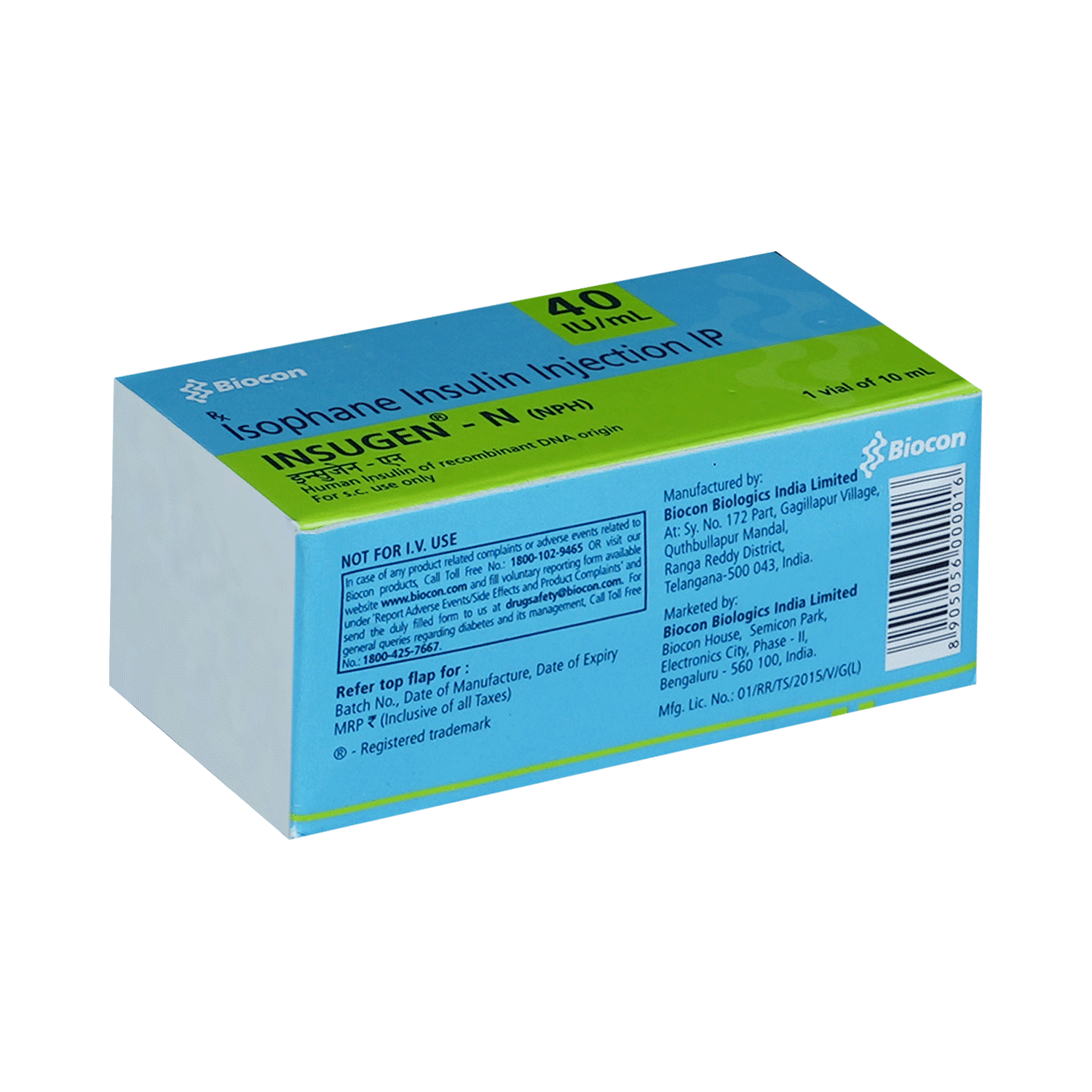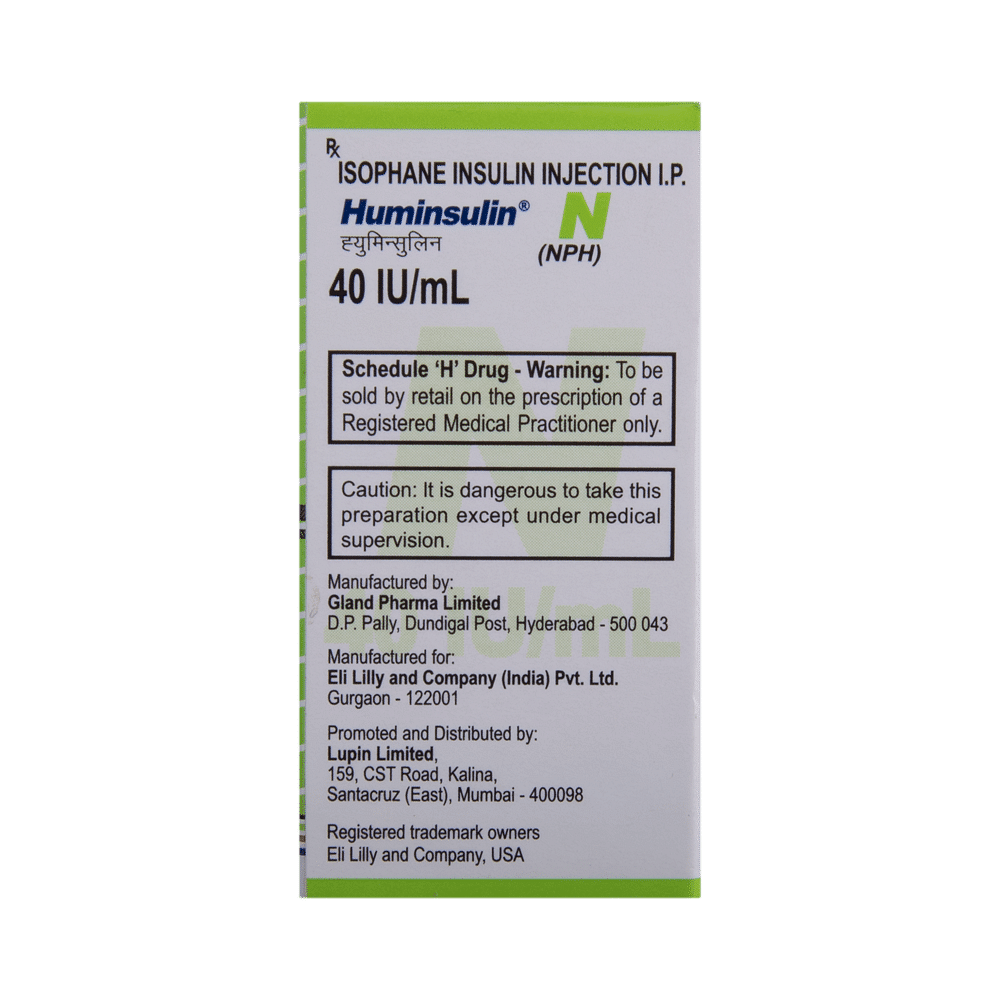






Insugen-N 40IU/ml Injection
Manufacturer
Biocon
Salt Composition
Insulin Isophane (40IU)
Key Information
Short Description
Insugen-N 40IU/ml Injection is used to improve blood sugar control in adults and children with type 1 and type 2 diabetes mellitus. It is an intermediate-acting type of insulin that helps to lower blood sugar levels and reduce the chances of developing serious complications of diabetes.
Dosage Form
Injection
Introduction
Insugen-N 40IU/ml Injection is often prescribed along with short-acting insulin or other oral diabetes medicines. Your doctor or nurse will teach you the correct way of injecting it under the skin. Don’t stop taking it unless your doctor tells you to. It is only part of a treatment program that should also include a healthy diet, regular exercise, and weight reduction as advised by your doctor. Check your blood sugar levels regularly, keep track of your results, and share them with your doctor. This is very important to work out the correct dose of the medicine for you.
Directions for Use
Your doctor or nurse will give you this medicine. Kindly do not self-administer.
Safety Information
Side Effects
Hypoglycemia (low blood sugar level) Reactions at the injection site like redness or swelling Lipodystrophy (skin thickening or pits at the injection site) Edema (swelling over the whole body due to fluid retention) Weight gain
Alcohol Warning
It is unsafe to consume alcohol with Insugen-N 40IU/ml Injection.
Breastfeeding Warning
Insugen-N 40IU/ml Injection is safe to use during breastfeeding. Human studies suggest that the drug does not pass into the breastmilk in a significant amount and is not harmful to the baby.
Pregnancy Warning
Insugen-N 40IU/ml Injection is generally considered safe to use during pregnancy. Animal studies have shown low or no adverse effects to the developing baby; however, there are limited human studies.
Interacting Medicines
Benazepril Captopril Enalapril Fosinopril
How it works
Insugen-N 40IU/ml Injection is an intermediate-acting insulin that starts working in 1-2 hours after injection. It works similar to the insulin that is produced by the body. Insulin facilitates reuptake of sugar in muscle and fat cells and also suppresses the production of sugar in the liver. This helps to lower the blood sugar levels in diabetes mellitus.
Quick Tips
Hypoglycemia (low blood sugar level) is a common side effect. Hence regular monitoring of blood sugar levels is required while taking this medicine. Injection below the skin of the abdomen results in faster absorption than other injection sites. Injection sites must be rotated to prevent hard lumps from developing at one site. Opened vials/cartridge are good at room temperature for up to 4 weeks while unopened vials must be placed in the refrigerator (2°C–8°C).
Related Medicines

Huminsulin N 40IU/ml Injection

Recosulin N 40IU/ml Injection

Iletin NPH 40IU/ml Injection

Biosulin N 40IU Injection

Insucare N 40IU/ml Injection

Longact 40IU/ml Injection

Humanext N 40IU/ml Injection
Frequently asked questions
How does biphasic isophane insulin work?
Insulin isophane is a recombinant human insulin analogue (genetically modified insulin produced in a lab that's similar to human insulin). It acts by replacing the body's own insulin production and helps move sugar from the blood into cells for energy. It also stops the liver from producing excess sugar. Intermediate acting insulin preparations start working within an hour or two after injection, reaching peak activity lasting up to 7 hours after which their effect fades; this overall duration is 18 to 24 hours.
What is Insugen-N 40IU/ml Injection? How is it made?
Insugen-N 40IU/ml Injection is a human insulin produced using biotechnology known as recombinant DNA technology. It's sold as sterile, clear, and colorless, containing insulin aspart along with other ingredients like glycerin, phenol, metacresol, zinc, sodium chloride etc.
Can Insugen-N 40IU/ml Injection cause hypoglycemia? How do I prevent it?
Yes, hypoglycemia (low blood sugar) can occur. It's more likely if you miss or delay meals, drink alcohol, exercise heavily, or take other diabetes medicines simultaneously. Always consume snacks as needed and don't skip meals. Keep regular track of your blood sugar levels. Have glucose tablets, honey, or fruit juice readily available.
What are the other side effects of Insugen-N 40IU/ml Injection? How to prevent them?
Possible side effects include redness, itching, pain, and swelling at the injection site. These are temporary and usually resolve on their own. Rarely, it can lead to lipodystrophy (abnormal fat tissue changes) from repeated insulin injections in the same area. This can involve lipohypertrophy (thickening of adipose tissue) or lipoatrophy (thinning of adipose tissue). Rotate injection sites to avoid these effects. Always use different areas of your body with each injection, and change locations every week or two.
How should Insugen-N 40IU/ml Injection be used?
Insulin aspart is injected subcutaneously under the skin. Your doctor will guide you on the best injection site. Avoid injecting in the same area repeatedly. Rotate your injection sites - for example, abdomen, buttocks, upper legs, or upper arms. Never inject into a muscle or vein.
Is Insugen-N 40IU/ml Injection given as an injection into a vein (intravenous)?
Sometimes, in specific situations like diabetic ketoacidosis or severe hyperglycemia, Insugen-N 40IU/ml Injection may be injected intravenously. However, this is only done by a doctor under close blood sugar monitoring in a hospital setting.
Is Insugen-N 40IU/ml Injection safe to use in pregnancy?
Yes, Insugen-N 40IU/ml Injection is generally considered safe during pregnancy if prescribed by a doctor. Always inform your doctor about your pregnancy status and any changes in diet or exercise routine before using it. They will recommend regular blood sugar monitoring throughout your pregnancy.
When does the dosage of Insugen-N 40IU/ml Injection need to be changed?
Consult with your doctor about dose adjustments if you experience weight gain or loss, increased stress, illness, changes in diet (missed meals), or new medicines. Also, monitor yourself for any unusual side effects that may require a dosage change by your doctor.


